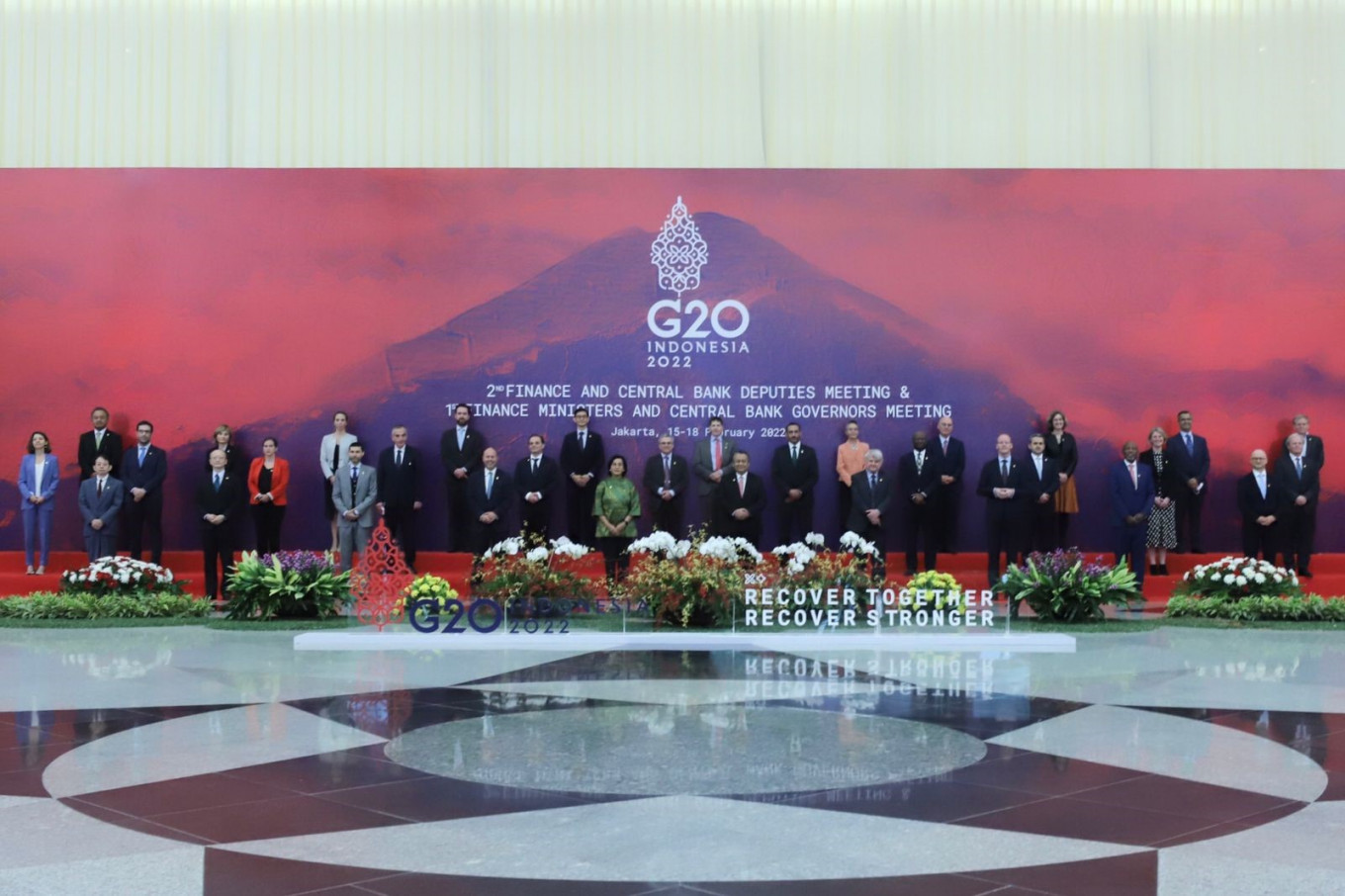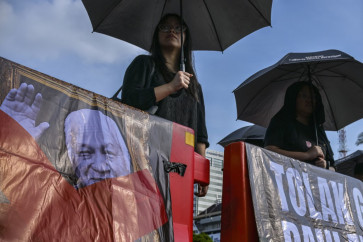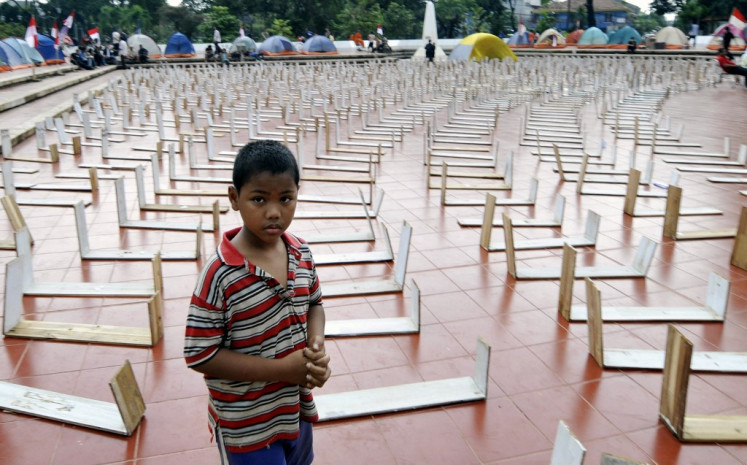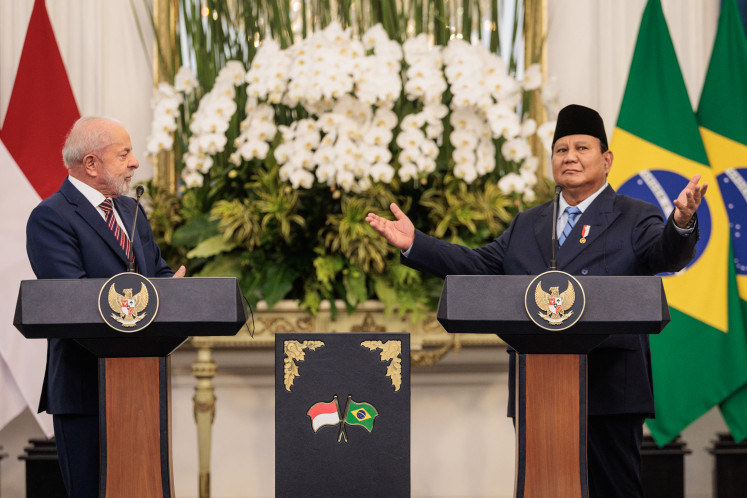Popular Reads
Top Results
Can't find what you're looking for?
View all search resultsPopular Reads
Top Results
Can't find what you're looking for?
View all search resultsGlobal collaborations forged to maintain economic recovery
A series of high-level meetings by G20 finance ministers and central bank governors (FMCBG) unveiled the importance of managing normalization and its impacts through global collaborations to maintain economic recovery momentum, a move that Indonesia’s G20 presidency highly endorses.
Change text size
Gift Premium Articles
to Anyone
A
series of high-level meetings by G20 finance ministers and central bank governors (FMCBG) unveiled the importance of managing normalization and its impacts through global collaborations to maintain economic recovery momentum, a move that Indonesia’s G20 presidency highly endorses.
The series of meetings, organized by Bank Indonesia (BI) and Ministry of Finance Republic of Indonesia held from Feb. 14 to Feb. 19 in Jakarta, discussed indispensable financial policies and strategies to cope with the impacts of pandemic.
In a discussion, titled ‘Exit Strategy and Scarring Effects Post Covid-19’, FMCBG said that to support macroeconomic and financial system stability, the G20 is committed to implementing well-calibrated, well-planned and well-communicated policies to normalize pandemic-related policies and overcome the long-term impact of the pandemic according to the conditions of each country.
“The policies are required in each country to heal the wound, particularly in terms of increasing productivity and fostering investment, together with sound strategies in terms of employment and capital reallocation,” Bank Indonesia Governor Perry Warjiyo said.
This needs to be done to anticipate the impact of propagation and long-term effects of the differences in the pace of economic recovery and the capacity to handle the pandemic, which have varied in each country.
Perry said that developing economies had to strengthen their resilience to the impact of policy normalization in order to maintain economic recovery and stability.
The strategy to overcome the scarring effect urges synergy and collaborative measures among all relevant parties. From a corporate perspective, the contribution includes strengthening business and banking strategies by participating in disbursing loans and other forms of financing to the real sector.
Amid current global uncertainty and the need to increase economic resilience, G20 reaffirms its commitment to strengthening long-term financial stability.
“By doing so, the G20 discussed efforts to increase sustainable foreign capital flows and encouraged a review of the International Monetary Fund's institutional views on liberalization, and the management of short-term capital flows to mitigate the risks,” Perry said.
Developing economies (DEs) must strengthen their resilience to the impact of policy normalization in order to maintain economic recovery and stability, he said.
The COVID-19 pandemic has disrupted government and private sector investment into infrastructure.
For this reason, the FMCBG were committed to pursuing the revitalization of infrastructure investment in a sustainable, inclusive, accessible, and affordable way, primarily through increased involvement of the private sector to support public investment and international financial institutions. This is in line with the G20 Roadmap to Infrastructure. The mobilization of infrastructure investment is also carried out to increase social inclusion and overcome disparities between regions.
The FMCBG also discussed sustainable economic and financial policies, addressing the challenges of climate change, which are essential factors to support economic growth.
In strengthening global efforts to achieve the goals of the United Nations Framework Convention on Climate Change (UNFCCC) and the Paris Agreement and implementing the commitments of the UN Climate Change Conference (COP26) and the policy mix toward carbon neutrality and net-zero emissions, the policy mix covers joint efforts and collaborations, including carbon pricing mechanisms and incentives, while providing targeted support to the poorest and most vulnerable countries, considering the national circumstances.
The FMCBGs reaffirmed the commitments of developed countries to immediately mobilize joint climate finance of US$100 billion per year by 2020 and annually until 2025 to meet the needs of developing countries, in the context of meaningful mitigation actions and transparency in the implementation.
The meeting also unveiled how the pandemic has created more awareness regarding the issues of digitalization and climate change, for which BI has instituted supportive measures.
In terms of digitalization, the challenges include inclusive finance and the development of digital currencies.
The financial sector plays an essential role in sustaining recovery momentum by absorbing shocks, facilitating the transition toward a green economy, enhancing productivity through new payment methods and disbursing inclusive finance.
Furthermore, financial intermediation, financial technology innovation and climate change issues are the three salient aspects of recovery.
G20 members also discussed how to manage risks and optimize benefits with the increasingly widespread use of technology and digitalization in the financial sector.
From the technology and digitization optimization perceptive, the G20 will continue the implementation of the G20 Road Map for Enhancing Cross-Border Payments to encourage fast, easy, economical, convenient and reliable payment systems, as well as to discuss the use of digitalization to increase financial inclusion, especially for vulnerable groups such as women, youth and small and medium enterprises (SMEs).
Regarding technology risk management and digitalization, the G20 members agreed on the need for a regulatory framework and supervision of crypto assets. The rapid development of crypto assets has to be monitored properly or it can cause instability in the economy.
The G20 also emphasized the importance of assessing the implications of Central Bank Digital Currency (CBDC) on the international monetary and financial system.
The communique that the FMCBG meetings have produced aligns with the theme of “Recover together, recover stronger” that Indonesia’s G20 presidency is carrying.










